 Petzlover
Petzlover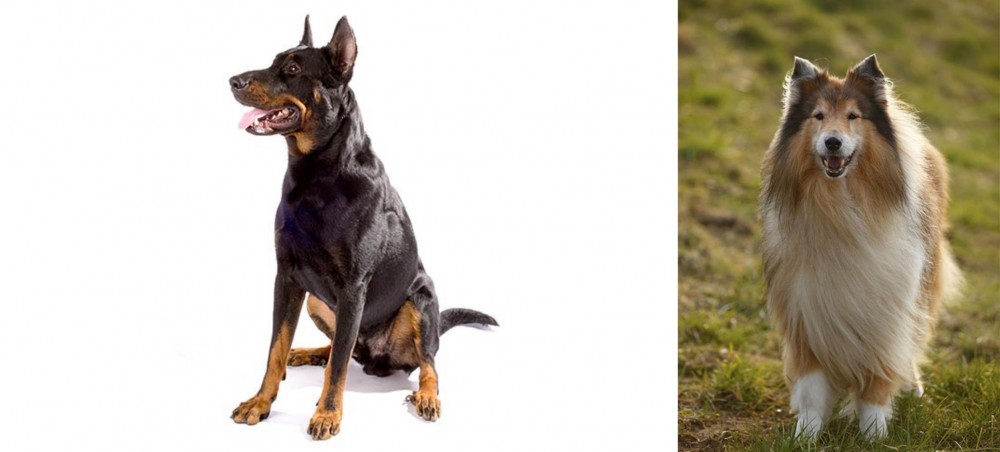 Beauceron is originated from France but Collie is originated from United Kingdom. Beauceron may grow 10 cm / 4 inches higher than Collie. Beauceron may weigh 21 kg / 47 pounds more than Collie. Both Beauceron and Collie has almost same life span. Beauceron may have less litter size than Collie. Beauceron requires Low Maintenance. But Collie requires Moderate Maintenance
Beauceron is originated from France but Collie is originated from United Kingdom. Beauceron may grow 10 cm / 4 inches higher than Collie. Beauceron may weigh 21 kg / 47 pounds more than Collie. Both Beauceron and Collie has almost same life span. Beauceron may have less litter size than Collie. Beauceron requires Low Maintenance. But Collie requires Moderate Maintenance
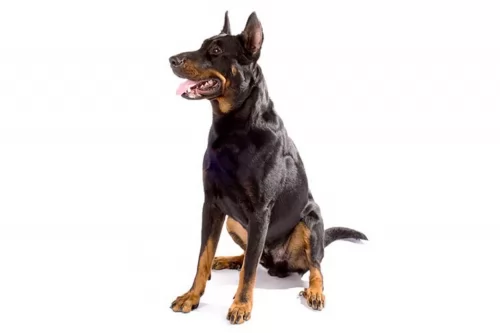 Sometimes referred to as the king of sheepdogs, the Beauceron is a French dog breed that happens to be an extraordinary herding dog too. He instinctively rounds up livestock without even being trained to do so. The dog is also known as Berger de Beauce, originating from the Beauce region in France and is closely related to the Briard or Berger de Brie.
Sometimes referred to as the king of sheepdogs, the Beauceron is a French dog breed that happens to be an extraordinary herding dog too. He instinctively rounds up livestock without even being trained to do so. The dog is also known as Berger de Beauce, originating from the Beauce region in France and is closely related to the Briard or Berger de Brie.
This French breed’s origin goes back to the late 16th century, and the Beauceron was divided into two working types way back in 1863 - the dog with the long coat was known as Berger de Brie or Briard while the short-coated dog became known as Beauceron. It was in 1922 that a club for this dog breed was established, and the Beauceron Club of America was established in 1980, only recently receiving recognition by the American Kennel Club.
 The Collie is a herding dog from Scotland and is also known by other names such as Rough Collie or Lassie Collie.
The Collie is a herding dog from Scotland and is also known by other names such as Rough Collie or Lassie Collie.
The first Collies used to be more in size as today’s Border Collies and they were also essentially black. Queen Victoria stepped in to save the Collie from obscurity, bringing some back to England where their popularity soared.
The looks started changing as they were bred and in 1860 they were shown at a dog show in Birmingham, England as ‘Scotch Sheep Dogs’.Later on the sable coat color was introduced.
In 1879 the first Collie was imported to the United States and a club for the dog breed was formed in 1886.
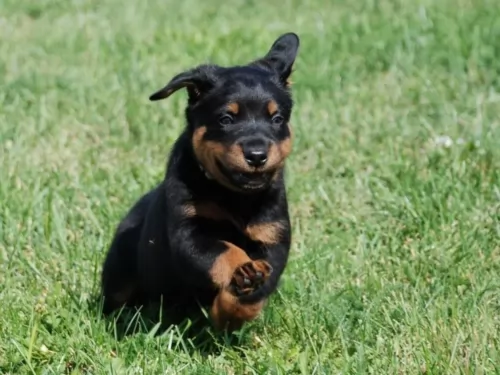 The Beauceron is an intelligent dog, just by looking at the alert, bright face. He is a muscular, large dog breed, standing up to 71cm in height and weighing in at up to 50kg. You’ll recognize him with his dark black coat with red markings, particularly around the feet, which interestingly gives this breed the French nickname Bas Rouge. It means red stockings. Harlequin, tri-coloured grey, black and tan is also recognized as a color.
The Beauceron is an intelligent dog, just by looking at the alert, bright face. He is a muscular, large dog breed, standing up to 71cm in height and weighing in at up to 50kg. You’ll recognize him with his dark black coat with red markings, particularly around the feet, which interestingly gives this breed the French nickname Bas Rouge. It means red stockings. Harlequin, tri-coloured grey, black and tan is also recognized as a color.
The coat is rough, short and dense, the alert eyes dark brown and the ears are set high and can be cropped or natural. The natural ears are half pricked or drop ears and are fairly short. Looking similar to the Doberman and Rottweiler but with a long tail, this French Shepherd dog is somewhat slimmer but with a foreboding appearance. He is solid, well proportioned and well muscled and gives the impression of strength. He has a tolerant nature and will fit in well with a family when trained and socialized.
 The modern Collie is a medium to large sized dog that stands at 51 – 61cm and weighs between 20 – 29kg. You could say that the popularity of the Collie grew because of the dog Lassie, a Rough Collie dog in the film ‘Lassie Come Home’. People who saw this film learned what a wonderful pet the dog could be.
The modern Collie is a medium to large sized dog that stands at 51 – 61cm and weighs between 20 – 29kg. You could say that the popularity of the Collie grew because of the dog Lassie, a Rough Collie dog in the film ‘Lassie Come Home’. People who saw this film learned what a wonderful pet the dog could be.
The Collie has two looks – the full coat which is known as the Rough Collie and the shorter coated Collie known as the Smooth variety. The coat comes in different colors but is essentially tri-colored in white, tan and black tips. The Collie has erect ears and a long, feathery tail.
Temperament of a dog is affected by a number of factors, including lifestyle of owners, heredity as well as whether the dog had training and socialization.
The Collie is a good-natured, friendly dog with no aggressiveness in him. He adapts well to city and country life, so long as he is with his human family, but he will need lots of exercise.
He will do well with training and socialization, turning into an even more splendid pet than he already is. He loves the children in the home and loves playing with them and watching over them. The Collie is intelligent and loyal and is easily trained.
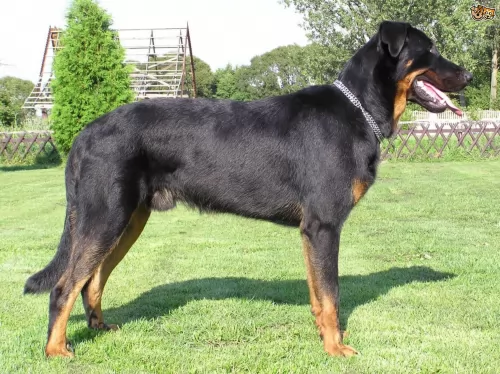 Strong, big, confident and good-looking the Beauceron makes an excellent watchdog, guarding the human family that he is so devoted too. He is a good friend and companion and is tolerant with children and other pets.
Strong, big, confident and good-looking the Beauceron makes an excellent watchdog, guarding the human family that he is so devoted too. He is a good friend and companion and is tolerant with children and other pets.
He is such a clever breed too, and its small wonder that he has always been sought after for hard work – herding, shepherding and even rescue work. When he’s not involved in working, at home, he’s just your big, devoted friend.
 Your Collie is an intelligent dog who will need physical exercise as well as mental stimulation too, otherwise he can develop some destructive behavior patterns that could be avoided just by seeing to his exercise needs.
Your Collie is an intelligent dog who will need physical exercise as well as mental stimulation too, otherwise he can develop some destructive behavior patterns that could be avoided just by seeing to his exercise needs.
He is easy to train and is a sensitive dog, wanting to learn and wanting to please.
A well trained Collie makes a wonderful pet. He is such a loyal dog that he will go to the ends of the earth for his owner, and guarantees to be every bit as affectionate, brave and loyal as the film-star dog, Lassie.
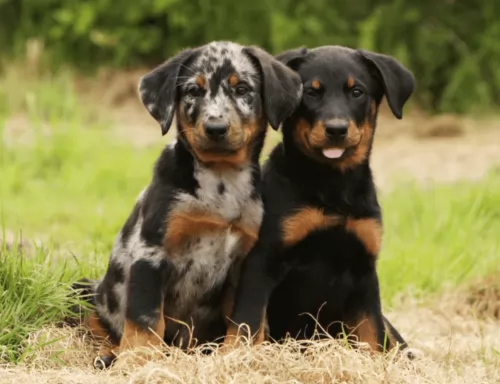 It’s such a nice strong, good-looking dog this, you can’t think of anything going wrong with him. His lifespan is anything from 10 to 14 years and the dog is pretty robust. Being a large breed and a pedigree, he is prone to some common ailments. When you suspect your beloved pet has any health issue, don’t hesitate to get him to the vet.
It’s such a nice strong, good-looking dog this, you can’t think of anything going wrong with him. His lifespan is anything from 10 to 14 years and the dog is pretty robust. Being a large breed and a pedigree, he is prone to some common ailments. When you suspect your beloved pet has any health issue, don’t hesitate to get him to the vet.
A painful disorder that affects larger dogs and brought about by an abnormal development in the joints.
Also a painful condition where the stomach twists so that the blood supply is cut off. Large breeds with deep chests are more prone to developing the condition. Rapid breathing and signs of pain can be indicative of this ailment.
 The Collie is a healthy dog breed generally, but just like with all other dogs, they are also prone to certain health conditions. It’s not to say that your Collie will get these diseases, but it can be beneficial to you and your pet’s health to be aware of them if you’re looking at the Collie as a pet.
The Collie is a healthy dog breed generally, but just like with all other dogs, they are also prone to certain health conditions. It’s not to say that your Collie will get these diseases, but it can be beneficial to you and your pet’s health to be aware of them if you’re looking at the Collie as a pet.
This is a condition where the skin of the nose peels and oozes and left untreated, it can be painful for your pet and could even lead to cancer.
This is an inherited eye disease that can actually lead to blindness. When certain parts of the eye don't develop properly it can lead to CEA - a genetic disease found in Collies as well as other dog breeds. The disease is also known as Choroidal Hypoplasia and brings about changes and abnormalities in the eye.
This is an abnormal formation of the hip socket and certainly dogs with hip dysplasia should never be bred as it can lead to pain and lameness.
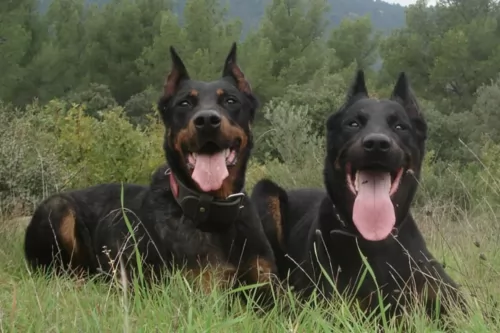 This is a large, hard-working, energetic dog and he will need high-quality food, whether commercially manufactured or home-prepared. The best commercially manufactured dog foods produce foods with the right balance of minerals and vitamins in keeping with your dog’s age, his activities and his stage of life (illness, senior, puppy). If you’re unsure about what to feed your Beauceron, speak to your vet to be 100% that you are meeting his nutritional demands, and always ensure a bowl of cool, clean water is constantly available.
This is a large, hard-working, energetic dog and he will need high-quality food, whether commercially manufactured or home-prepared. The best commercially manufactured dog foods produce foods with the right balance of minerals and vitamins in keeping with your dog’s age, his activities and his stage of life (illness, senior, puppy). If you’re unsure about what to feed your Beauceron, speak to your vet to be 100% that you are meeting his nutritional demands, and always ensure a bowl of cool, clean water is constantly available.
You’re lucky with the Beauceron as he is a low shedding, low maintenance dog with his short coat. He doesn’t require any trimming but will need a good brush twice a week to rid him of loose hairs. Clean his teeth with a special dog toothbrush and toothpaste to avoid plaque buildup. Never use human toothpaste. Clip his nails if he doesn’t wear them down naturally.
This is a big, strong, energetic dog, and you owe it to him to ensure he gets lots of exercise – runs, walks and ball games. If you can’t be a responsible dog owner, don’t own a breed like this as he can become destructive if not kept active.
 The Collie will need grooming because of his long hair, and you will need to brush it at least twice a week to rid it of loose hairs and to keep it free from tangles. This is especially important if you live in the country and he leads an active lifestyle running through fields.
The Collie will need grooming because of his long hair, and you will need to brush it at least twice a week to rid it of loose hairs and to keep it free from tangles. This is especially important if you live in the country and he leads an active lifestyle running through fields.
Keep a constant check on your Collie’s ears because dirt build-up can lead to an ear infection. Your vet can advise you on how to clean your dog’s ears. Make sure you have your Collie’s nails trimmed.
To cater for your Collie’s size and activity levels, make sure to feed him good food that meets his nutritional needs. Protein is the most important nutritional need for dogs, and apart from feeding your dog quality kibble, protein should also come from raw, animal-based sources such as meat, fish and poultry.
You can also include some cooked brown rice, vegetables and cooked chicken to provide variety. Make sure he always has fresh, cool water available.